“Jeez… what kind of interview is this?”
Scott Gorham is narked. The guitarist has spent almost two decades fending off accusations of opportunism over the various line-ups of Thin Lizzy he’s led since the death of Phil Lynott. Now he’s just been asked whether stepping away from this reliable income stream to launch his ‘new’ band Black Star Riders could be interpreted as an attempt to nix those ‘tribute band’ accusations once and for all.
It’s the word ‘tribute’ that has raised his hackles, and it’s enough to peel off a bit of the veneer of affability that’s part of the laid-back Californian’s persona.
In fairness, it’s hardly an unfair description of the various incarnations of Thin Lizzy that have trodden the boards since 1996. The first featured Gorham and original Lizzy drummer Brian Downey plus late-period Lizzy members guitarist John Sykes and keyboard player Darren Wharton, but it soon became an ever-shifting gallery of ill-fitting individuals.
All that changed in 2009 when Sykes left the band acrimoniously and Gorham had to rebuild Lizzy from the ground up. His star signing turned out to be former Almighty frontman Ricky Warwick. A charismatic presence more than capable of filling Lynott’s shoes, Warwick was an unexpected success to just about everyone except Gorham himself.
Even so, the news that the band were going to record a new album got a mixed reaction. Long-time Lizzy fans accused Gorham and his band-mates of desecrating Phil Lynott’s memory, even though the fact that it would be an album of new material would suggest emphatically that they were not a ‘tribute’ band. The announcement that they were renaming the band Black Star Riders took some of the sting out of it, but suspicions remained in some quarters that Gorham was continuing to milk the Lizzy legacy. Rumours suggesting the name change was prompted by the Lynott estate didn’t help the BSR cause. They were damned if they did, damned if they didn’t.
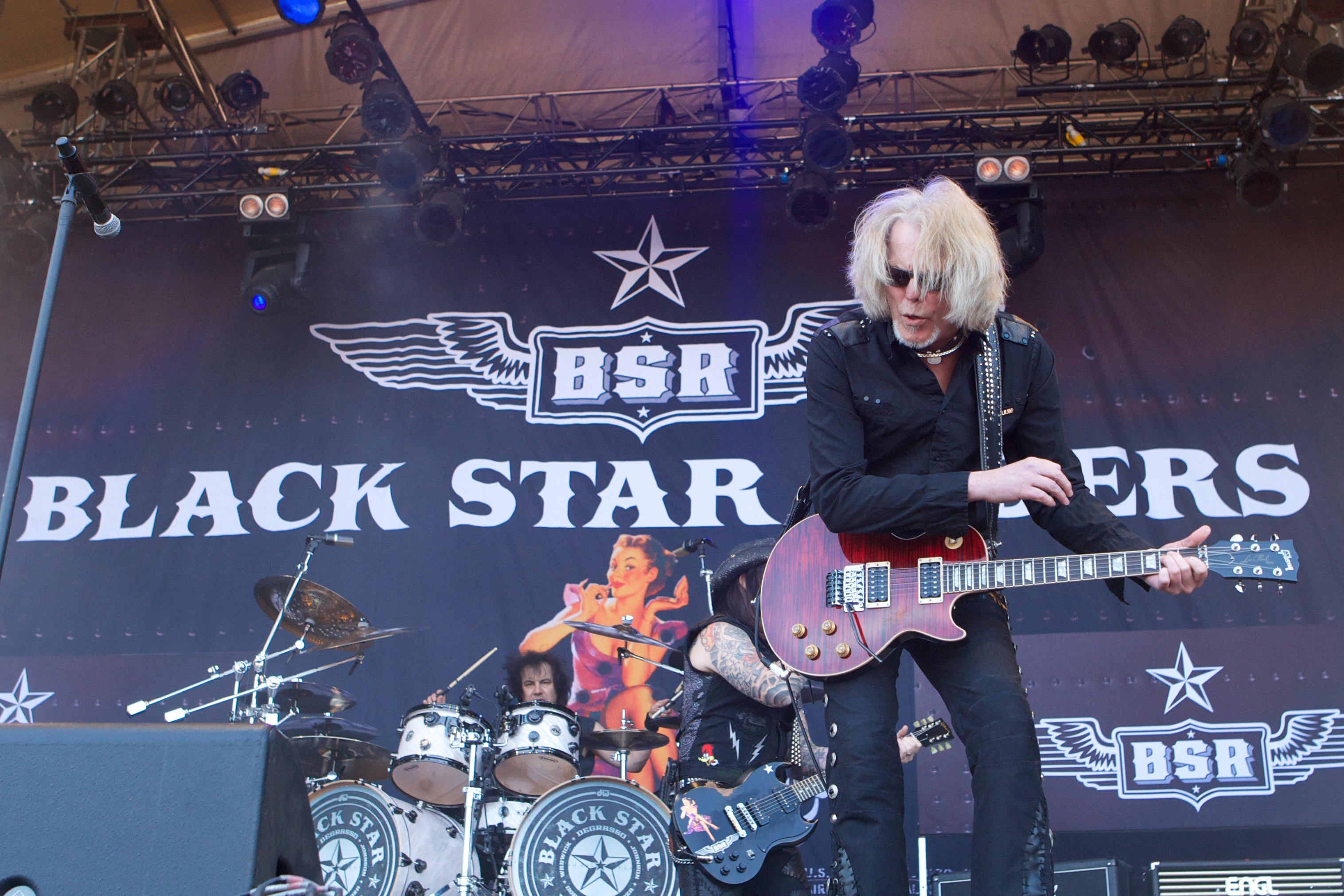
Over the past few days, Gorham has been fielding questions that are rapidly becoming familiar, some irritating. Chief among them is: what are their motives for changing their name?
“We became Black Star Riders because I felt uncomfortable recording as Thin Lizzy,” the guitarist explains testily. “It just didn’t feel right without Phil Lynott being there. Brian Downey felt the same way, though that’s not the reason he’s not a part of BRS. He just didn’t want to tour any more. Ricky Warwick and Damon Johnson were in agreement too. And that’s where Black Star Riders came in.”
The name Thin Lizzy was officially semi-retired last December. By then, work was already under way on what would either be the first Thin Lizzy album without Lynott, or the debut album by a brand new band, depending on how cynical you wanted to be.
The thorny issue of releasing new Thin Lizzy material without Lynott has been around as long as this magazine. Back in November 1998, in the first issue of Classic Rock, Gorham mused: “It might be sacrilegious to record without Phil [but] you cannot discount the possibility.”
Ultimately, the notion fizzled out and, apart from a three-year hiatus between 2001 and 2004, the Sykes/Gorham-led version of Thin Lizzy continued to make a presumably healthy living from recycling the hits for Lizzy audiences old and new. Nevertheless, when Sykes quit, Gorham considered laying the band to rest once and for all.
“When I busted up with Sykes, I was forced to ask myself: ‘Do I want to keep going on with this? Should I go on with it?’” he says. “Management were calling, insisting that I kept Thin Lizzy up and running. With the line-up changes and some of the things said in the press, my reputation had been painted with a horrible brush.”
Tellingly, the source of his anxieties were much the same things they’ve always been accused of post- Lynott: that Lizzy were trading on past glories; that they were sullying their original singer’s name; that they were nothing more than a tribute band.
“It really sowed a seed of doubt,” he says. “It also really annoyed me, because it was the exact opposite of what we saw from the stage. We’d go out there and kick some severe ass, the entire place would go nuts, and you’d read ‘tribute’ this, or ‘tribute’ that. With all the work that’d been put into the band, it really hurt.”
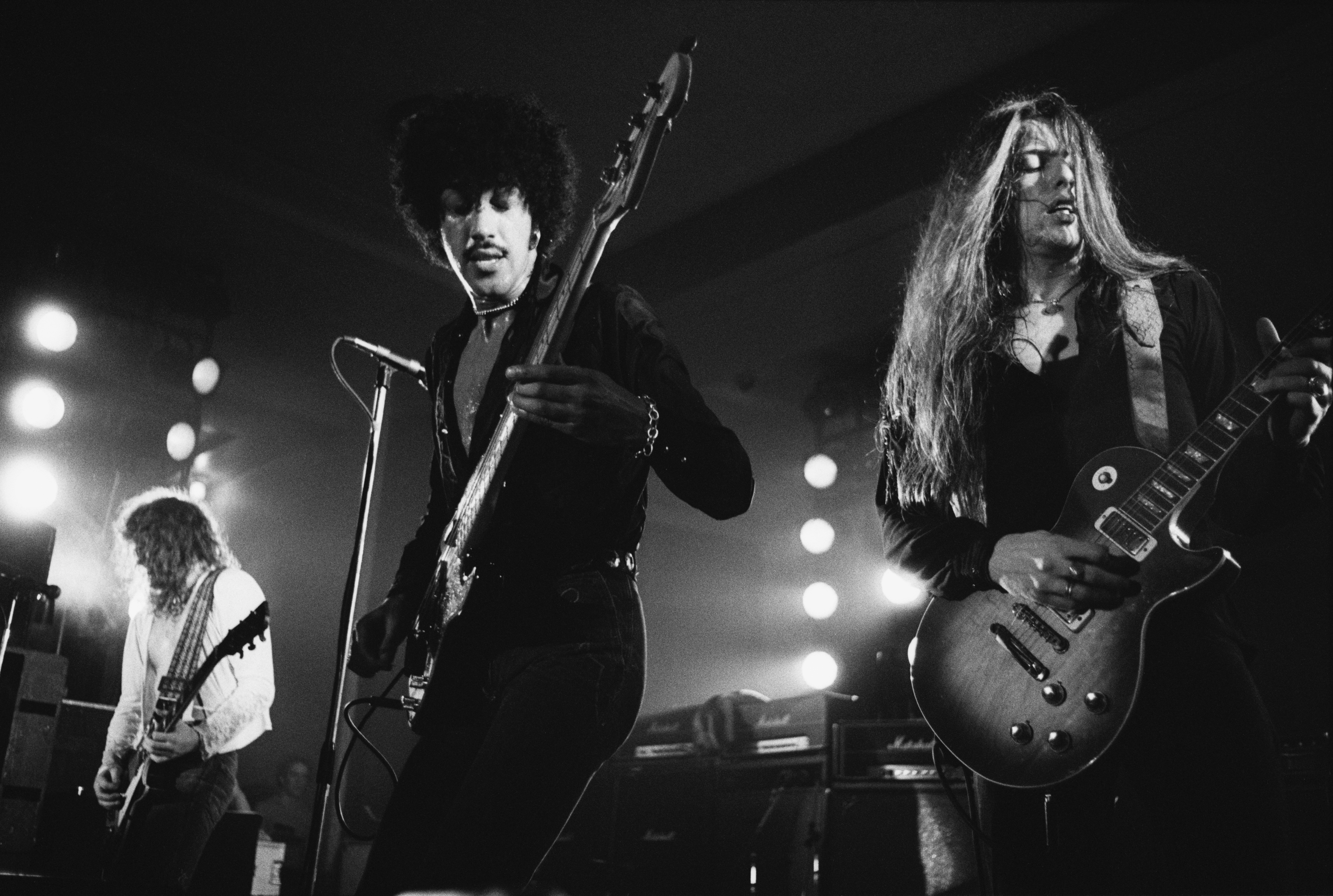
It was Gorham’s faith in Thin Lizzy as a bigger entity that saw him through this uncertain period. The approval of drummer Brian Downey, who’d played with the resurrected line-up in the mid-90s, convinced him that continuing with the band was the right thing to do.
“I knew I could rebuild the band, and it could be better than before,” says Gorham. “I thought I’d need months and months, but glueing the whole thing back together took just two weeks. Had it not done so…” His voice trails off momentarily. “I’d probably have bottled out. But the stars were aligned.”
Getting musicians on board was easy. Downey and keyboard player Darren Wharton returned, bassist Marco Mendoza stayed on from the Sykes-era line-up, and guitarist Vivian Campbell came in on loan from Def Leppard. There was just one question left: who to get as their singer.
It was Leppard frontman Joe Elliott who suggested Campbell as their guitarist. The Leppard frontman also reminded Gorham that he’d played on Ricky Warwick’s 2003 debut solo album, Tattoos & Alibis, suggesting that Warwick was worth considering.
“I remember the timbre of his [Warwick’s] voice,” Gorham says now, “and the way he phrased things. He was very Phil-like. Equally importantly, the songs told stories.”
It mattered little to Gorham that Warwick’s star was dimmer than it had been when he’d fronted The Almighty in the 90s. “I wasn’t going for a big name,” he says. “Thinking short-term with a well-known singer, you might sell a few tickets, but it never lasts. I was thinking permanent. The whole revolving door thing was really starting to get me down.”
Warwick signed up, though the door hadn’t quite stopped revolving. Campbell returned to Def Leppard and was briefly replaced by Guns N’ Roses/Psychedelic Furs guitarist Richard Fortus. But it was only when the latter was himself replaced by Damon Johnson of cult US band Brother Cane that the first step in the latest rebirth of Thin Lizzy was complete.

For Ricky Warwick, it’s been a long journey to get to this point. Born in County Down, Northern Ireland, he earned his spurs as touring guitarist with proto-crusty thunderers New Model Army, before forming his own band, The Almighty. That outfit’s greasy, biker-bar rock briefly lit up the moribund British rock scene of the early 90s, releasing seven albums before disbanding in 1997 in the face of diminishing public interest.
His subsequent career progressed in fits and starts. A pair of solo albums – including Tattoos & Alibis, which featured Gorham – revealed a love of blue-collar American rock, though a stint alongside The Cult’s Billy Duffy in the short-lived Circus Diablo did neither parties many favours. When that fell apart, he returned to his one-man-and-his-guitar guise for 2009’s Belfast Confetti. Then, in September of that year, he got the call from Gorham asking if he wanted to join Thin Lizzy.
“When I put down the phone after accepting Scott’s offer, I thought, ‘Holy shit, what have I let myself in for?’” he says. “Panic set in and I said to my wife Tina, ‘Whenever this starts to feel wrong, I’ll stop.’ With hand on heart, it took a while for that moment to come.”
Today, Warwick is unrecognisable as the snotty, swaggering kid who formed The Almighty in 1988. The flame-coloured hair is still there, as are the tattoos, but offstage he’s disarmingly modest, to the point where he calls the events of the last three years “surreal”. When he joined Thin Lizzy, he spent months poring over Lynott’s lyrics. Similarly, he dissected every last nuance of the band’s music. When you’re filling a dead man’s shoes, the devil is in the details.
“Being with Lizzy taught me timing, about singing and phrasing, also about attitude and, of course, how to write,” he says.
Warwick never got a chance to see Lizzy with Lynott, though he did catch a gig by the singer’s later band, Grand Slam. Neither has he witnessed any of the other post-Phil line-ups, though he appreciates why they’ve attracted the criticism they have, up to and including the present line-up.
“Of course,” he shrugs. “Some people just want to remember things the way they were. I completely respect that. We know as much as anyone that nothing can be the same, but if people leave our shows saying, ‘That’s as good as it can possibly be without Phil,’ we’ve done our job.”
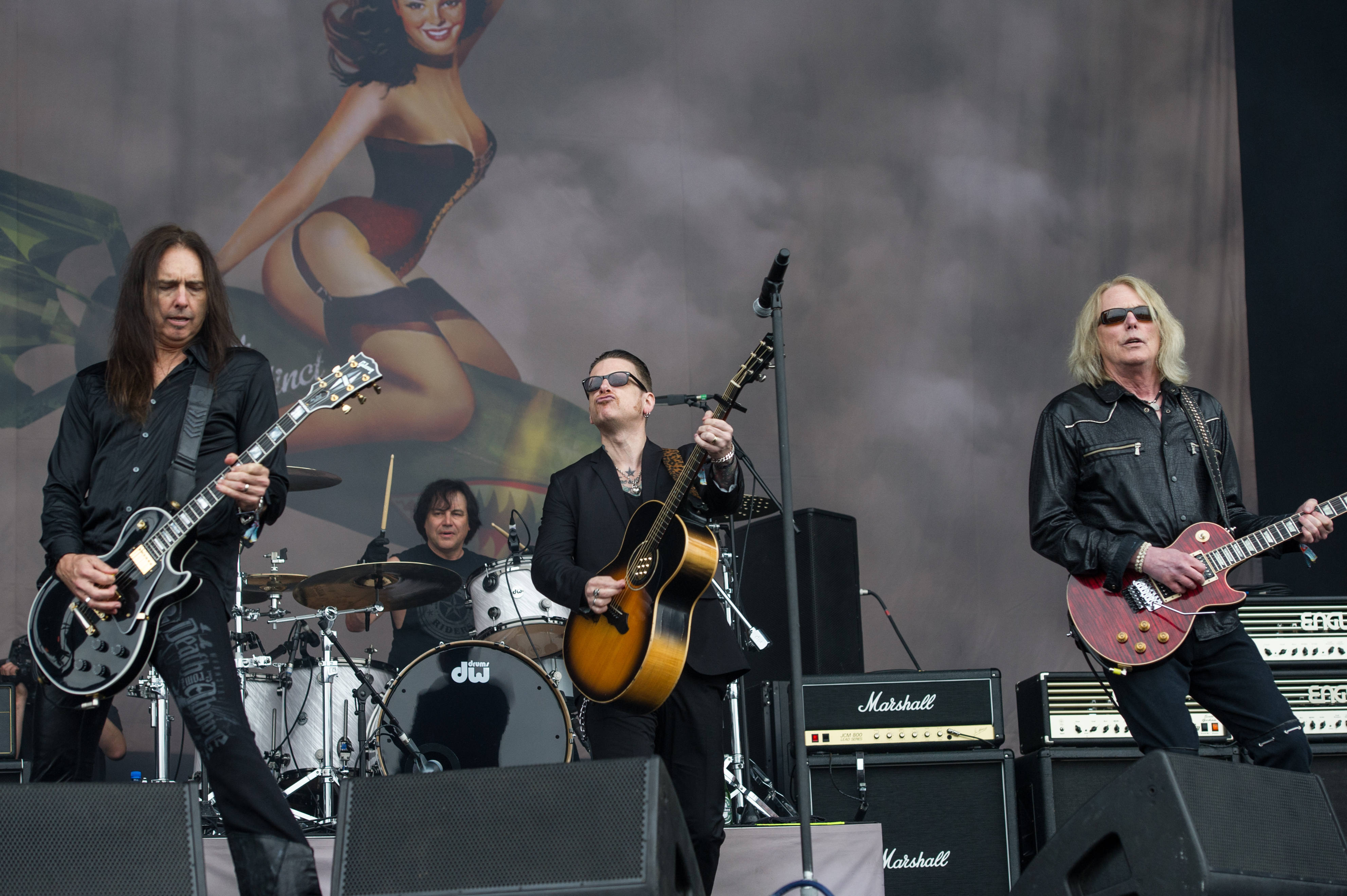
The Warwick-fronted band were well received, building up enough goodwill to almost silence the critics and cynics who thought they shouldn’t be doing it without Lynott. But when the band finally committed to making a new album – via an apparently undramatic series of phone calls – the shit hit the fan once more.
“That moment took a long time to come,” he says. “When we began making demos I went through a rollercoaster ride. The fan inside me was ecstatic that I was going to be on a Thin Lizzy album, but a few days later I’d find myself thinking: ‘Shit, Phil’s been dead for more than 25 years.’ It didn’t sit right with me. When the subject was finally raised by Scott, there was an outpouring of relief. It also brought some other issues to the surface, including how Brian [Downey] and Darren [Wharton] felt about going out on tour again.”
By the end of 2012, Downey and Wharton were no longer members of Thin Lizzy. But by that point, Thin Lizzy itself no longer really existed.
Ever since their re-branding, rumours have circulated that Gorham and co had no choice but to adopt another name after the Lynott estate refused to let them record as Thin Lizzy. It’s something the guitarist is keen to lay to rest.
“I can tell you with all honesty that it never reached the point where we needed to consult them,” he insists. “[Phil’s mother] Philomena doesn’t have anything to do with it [the estate]. It’s Caroline and her husband Dave T [short for Taraskevics] and of course the two girls [Phil’s daughters Sarah and Cathleen]. They’ve been to a couple of our concerts and as far as I’m concerned they’re good people. We get along fine. No, it wasn’t necessary to consult with the estate. I can imagine that they probably wouldn’t have liked the idea of a new Thin Lizzy album, but we nipped things in the bud before things got that far.”
It was Warwick who was responsible for the name Black Star Riders. He and Gorham are fans of Westerns, and the pair would sit at the back of Lizzy’s tour bus watching movies. One such film, Tombstone, featured a bunch of antagonists named The Black Star Gang.
“Ricky spotted the potential,” says Gorham. “He suggested swapping ‘gang’ for ‘riders’, which was way cooler.”
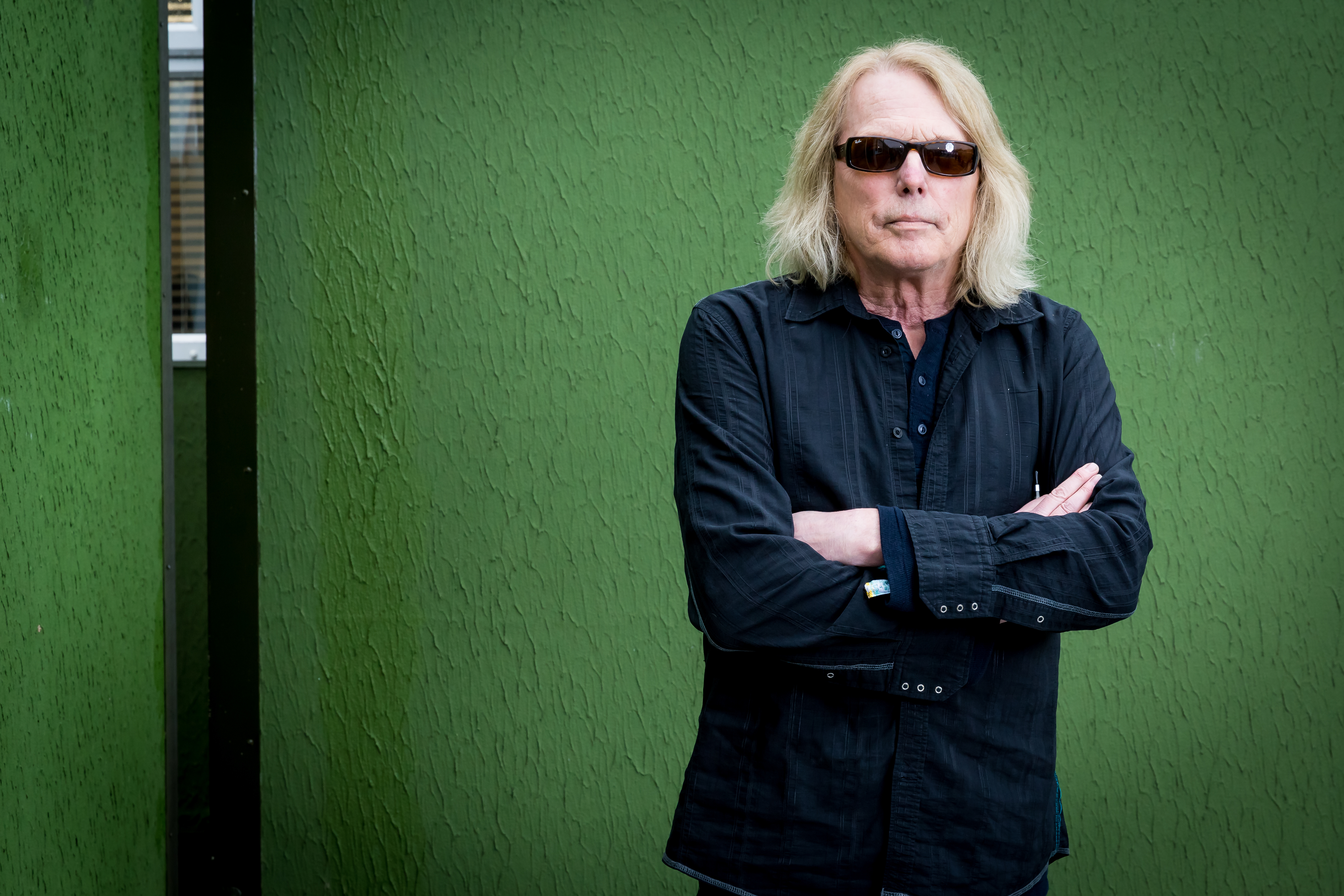
It’s a revealing anecdote about their relationship. Both describe it, independently of each other, as an “equal partnership”, despite the differences in age and background.
“In Thin Lizzy, obviously, I’m the all-round boss,” says Gorham. “The employer, if you like. But I do talk things through with everybody before those important decisions. Flipping over to Black Star Riders, that’s a very different situation. We started all of this together and everybody is an equal partner.”
If the credits of the band’s debut album, All Hell Breaks Loose, are anything to go by, Gorham played a lesser role in writing the songs. Only five of the 11 songs have his name next to them, leaving the heavy lifting to Warwick and fellow guitarist Damon Johnson.
They’ve done an admirable job. Black Star Riders isn’t a Thin Lizzy album, but several of its songs are worthy of the Lizzy name. Gorham may have attempted to put clear water between the new band and their previous incarnation , but the spirit of Lynott is never far away on the album.
“Any band I’m in will goddamn always sound like Thin Lizzy, because every guitarist I play with wants to do the harmony thing,” he says. “I started out trying to do less of that in BSR, but then I got caught up in the vibe – we added harmony guitars everywhere because it sounded like the right thing to do.”
First single, Bound For Glory, is the perfect summary of the band’s relationship with their own past. A cracking, twin guitar-fuelled-anthem-in-waiting, it undoubtedly shares musical DNA with Lizzy’s classic 1979 hit Waiting For An Alibi, while the resemblance between Warwick’s voice and phrasing and that of Lynott is startling. The singer doesn’t even try to defend either similarity.
“Why should I? I was in Thin Lizzy for the last three years and I’m going to carry that forwards into Black Star Riders,” he says. “I wasn’t going to growl like I was still in The Almighty. Maybe my studying of Phil’s phrasing in those old Lizzy songs has seeped into my DNA? I’m singing – really singing – for the first time in my life.”
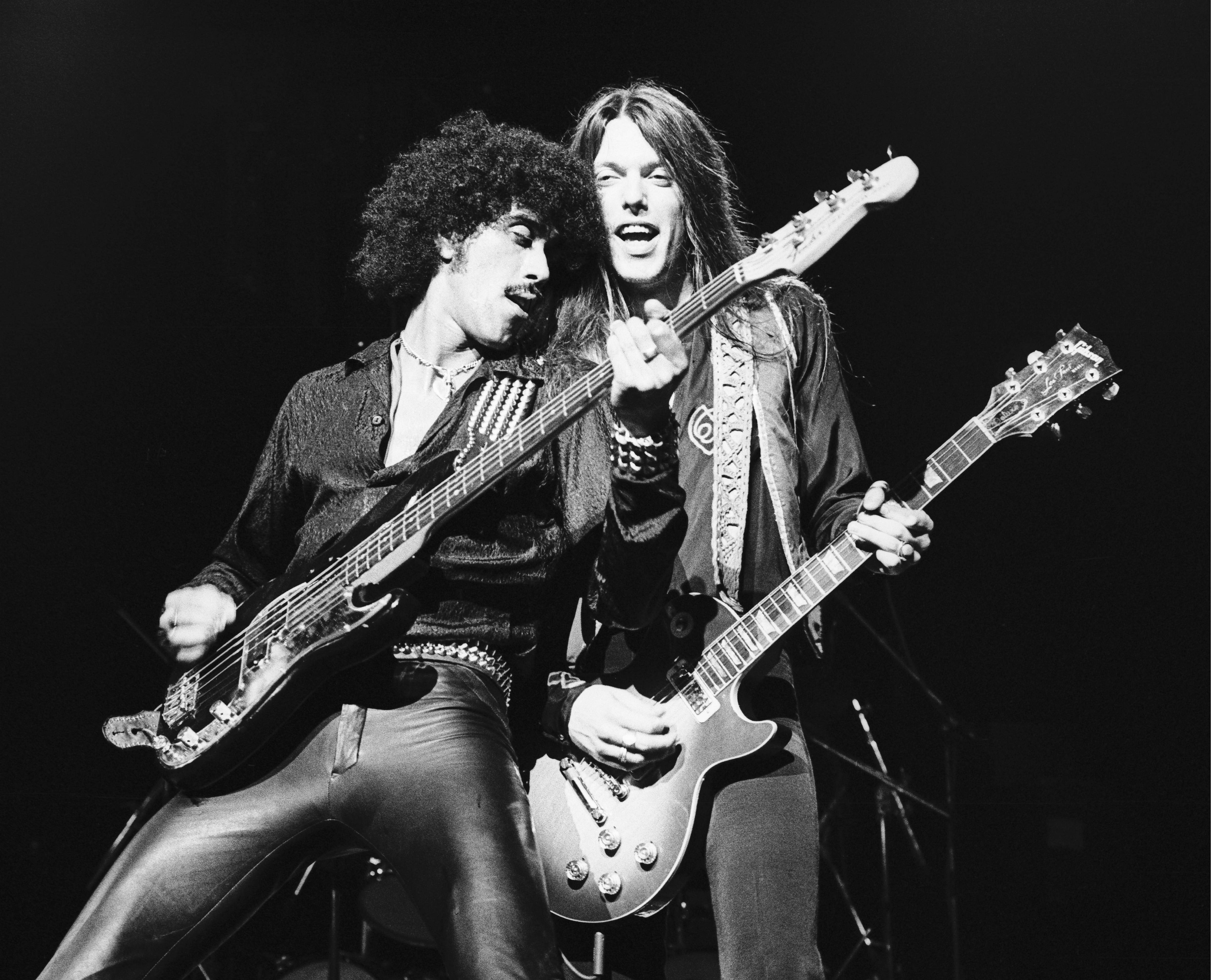
Reaction to the single was mostly warm, though there were inevitably disgruntled mutterings from some fans that were never going to take Black Star Riders seriously. “BSR are nothing more than a poor man’s watered-down cover band,” wrote one commentator on the CR website. “Face it people, it’s a piece of shit.” Gorham is understandably annoyed when presented with the quote.
“I leave it to Ricky and Damon and the management to go on the message boards; I don’t spend a lot of time on there,” he says, failing to conceal his frustration. “Thin Lizzy has always attracted passionate opinions, and that’s still the case. It’s something I’ve dealt with for my whole life. If you let them affect you, you’d never leave your front door.”
It’s hard not to have some sympathy for Gorham. If he’d carried on playing the old hits with the band he was part of for a significant chunk of his life, he’d still be batting away the ‘tribute band’ accusations. If he’d made a new record under the Thin Lizzy name, he’d be accused of cashing in on his late band mate’s name. If Black Star Riders is a compromise, it’s one of the very best kind.
“People thought we were nuts to even try and make a new album,” says Gorham, laughing drily. “They asked: ‘Why are you doing this? You’ve got sold-out tours all over the world.’ The bottom line is that it was time to stand on our own two feet.”
Gorham suggests the Thin Lizzy name could be resurrected in the future, for festival appearances or one-off shows, but right now his focus is on Black Star Riders. Of course, the big question is: what would Phil Lynott think of the record? Gorham’s reply is unequivocal. “He’d fucking love it,” he says. “If Phil heard the songs, the sound and performance level, I think he’d give it the thumbs up, man. It kicks ass.”
His voice crackles with emotion. “Listen, Phil’s been dead for 27 years. I miss the guy. I miss not being able to call him up and do the crazy shit we used to do together. But I’m not fixated upon Phil, and I don’t use his name for personal gain. I’ve loved coming up with this new material and I’ll defend the new band till my dying breath.”
This article originally appeared in Classic Rock #185.

